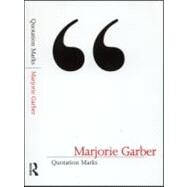Quotation Marks
, by Garber,Marjorie- ISBN: 9780415937467 | 0415937469
- Cover: Nonspecific Binding
- Copyright: 11/8/2002
Jane Austen, fashion, Monica, Shakespeare, terms of address, quotations, quotation marks, sequels, nostalgia, and Hubbard squash. In this new book of essays, the brilliant cultural critic Marjorie Garber turns to the history of words, great writers, everyday speech, and the unspeaking, painted image to spin tales about the way we live. What do we remember and whom do we quote, and why? "Everyone complains of his memory, and no one complains of his judgment," wrote La Rochefoucauld. Marjorie Garber quotes the French writer, and goes on to consider what quotation does for and to us. Written with characteristic verve,Quotation Marksconsiders, among other subjects, how we depend upon the most quotable men and women in history, using great writers to bolster what we ourselves have to say. The entertaining turns and reversals of Marjorie Garber's arguments offer the rare pleasure of a true essayist. What does morality have to do with style? What's the difference between work and "work"? What do weadmire and what do we imitate, and what does either have to do with love? Why are sequels so enticing, she asks, and in an essay on sequels (including those toGone with the Windand Jane Austen's novels), she reminds us that the New Testament is, after all, the most successful sequel ever told. The centerpiece of the book is a lavishly illustrated essay on paintings of inanimate objects, especially vegetables, in which Marjorie Garber explores our cultural predisposition to assign gender to things and to see personal relations where there may be nothing more than two pears on a plate. Reading these essays is to experience the pleasure of watching a remarkable critic grapple with the curious and the everyday, and make both speak to the question between the quotation marks: "Who are we now?"






